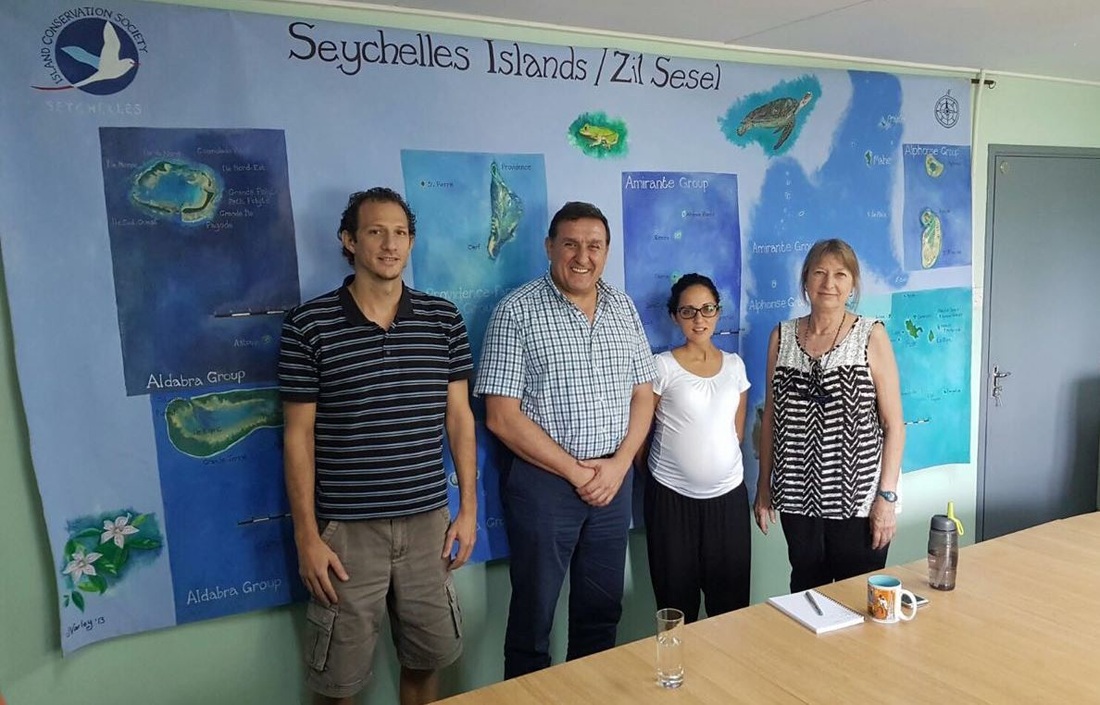The Spanish Purse Seining Fishing Association (OPAGAC/AGAC) joins forces with the Island Conservation Society, Islands Development Company and Seychelles Fishing Authority to resolve issues pertaining to Fish Aggregating Devices.IntroductionA fish aggregating device (FAD) is a man-made floating platform, attached with an array of nets and ropes (which varies from vessel to vessel and type of fish being targeted) dangling from the platform down to depths of 40 or so metres, to attract oceanic fish such as tuna. The FADs also have a radio beacon attached to them to allow the fishing vessels to follow their movement and make oceanic fish easier to catch. They are widely deployed by Purse Seining fishing vessels in tropical and subtropical regions. Since the early 1990’s FADs have become an increasingly important component of the industrial purse seine fishing fleet operating throughout the Seychelles EEZ and the wider Indian Ocean basin. It is estimated that there are now 10,000 FAD deployments annually in the Indian Ocean. A third of all tuna catches by purse seiners in the Indian Ocean are around floating objects. Satellite tracking of FADs has probably been the most important technological advancement of purse seiner efficiency in the last two decades. The increased use of FADs has been responsible for a significant increase in the amount of tuna caught, particularly skipjack tuna (Indian Ocean catches of skipjack tuna around floating objects more than doubled between 1991 and 2006). The concern and proposed solution: welcoming the Seychelles FAD WATCH ProgrammeADs have a number of well documented issues. Catches around FADs are on average made up of smaller (younger) target fish. This could have long term consequences for these fish stocks managed through the Indian Ocean Tuna commission (IOTC). There is also the problem of by-catch of non-target species associated with seine netting around FADs, as well as marine creatures getting entangled in the FAD itself. A problem, that is so far relatively undocumented, is the environmental impact that FADs can have when they are either intentionally discarded or become lost and drift onto coral reefs and islands. This is a situation that is becoming increasingly common on the reefs and islets especially in the outer islands of the Seychelles. Fortunately, some concerned organisations are coming together to solve part of this problem. FAD WATCH is a collaborative programme between several organisations with the aim of preventing and mitigating Fish Aggregating Device (FAD) beachings across islands in Seychelles where the Island Conservation Society (ICS) has a presence. A Memorandum of Understanding (MoU) was signed on the 5th July 2016 by the Spanish Purse Seining Fishing Fleet (OPAGAC/AGAC[1]), Island Conservation Society (ICS), Islands Development Company (IDC) and Seychelles Fishing Authority. And the whole process has gained substantial support by the Ministry of Finance, Trade and the Blue Economy over the past 9 months of negotiations. [1] Organización de Productores Asociados de Grandes Atuneros Congeladores + Asociación de grandes Atuneros Congeladores (España/Spain) How will the programme work?Under this programme, ICS will be responsible for the implementation and overall coordination of activities. The 4 fishing companies associated under OPAGAC/AGAC will provide real time information of their FADs when drifting into the sensitive ecosystem areas determined by ICS. An automated alert system will be setup at ICS that will report whenever a FAD arrives within 5 nautical miles of any atoll where ICS has a permanent presence, and provide GPS co-ordinates, trajectory and estimated projected time of beaching. This will allow ICS staff time to plan and intercept these FADs before beaching occurs, damages reefs and/or impacts on key marine fauna. ICS teams will still need to remove FADs from reefs and beaches on all islands where teams are present which are not intercepted as they will not be detected using this system since they will belong to other fishing companies. IDC will provide logistical support to ICS in the removal and storage of the FADs awaiting collection by the fishing vessels. As much as possible the FADs that are collected will be recycled and reused by the fishing companies. This programme is made possible through the financial contribution from OPAGAC/AGAC. ICS will also be working closely with the fishing companies to provide suggestions on how to improve the design of eco-friendly FADs.
This is a world first and a ‘win-win’ for all involved. It is the first time such an arrangement has been made between a fishing association working in close relationship with an environmental NGO, and Government on such a subject. We are hoping that this will encourage other purse seining organisations and other islands that are impacted by FADs to join this effort in the future.
1 Comment
19/8/2019 12:26:27
We recently thought of this idea for the Hawaiian Islands and other US territories in the Pacific. Has your program lead to salvaging a FAD before stranding? How did you go about talking with the fishery?
Reply
Your comment will be posted after it is approved.
Leave a Reply. |
Categories
All
Archives
June 2024
|







